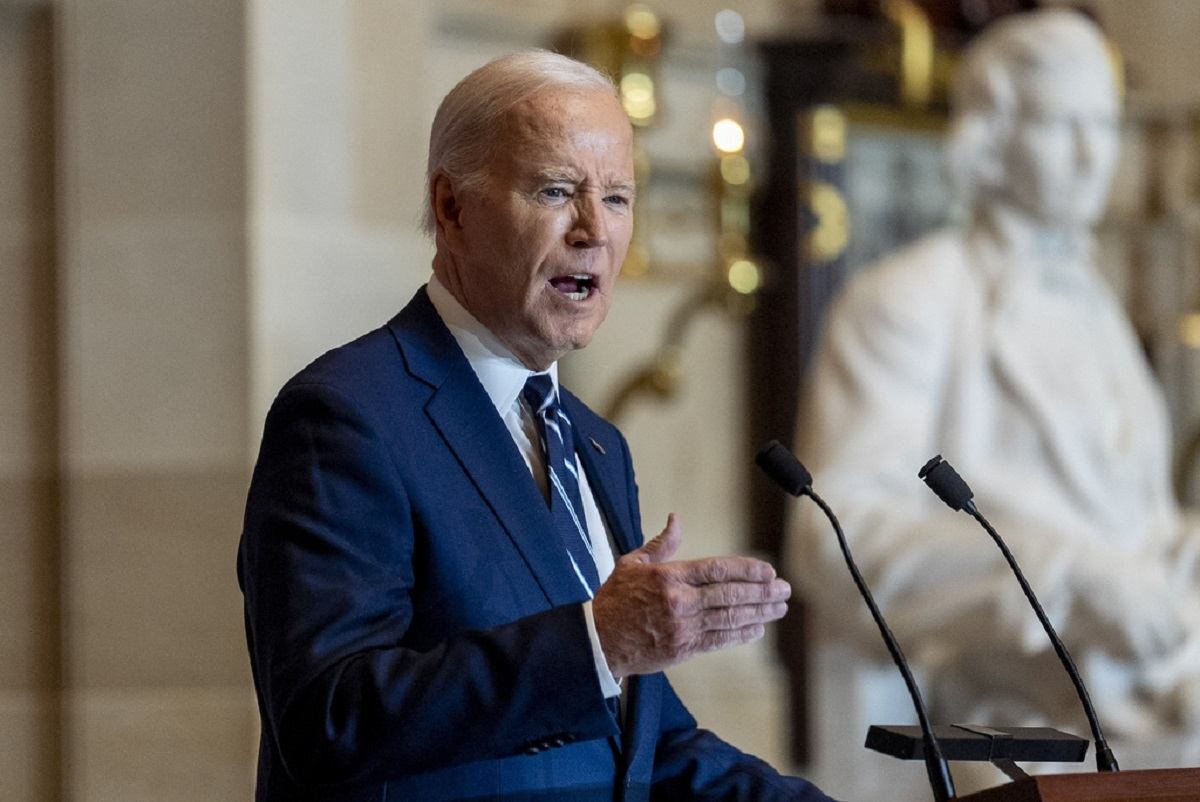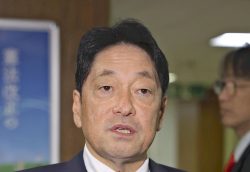Biden Sanctions Israeli Settlers Accused of Attacking Palestinians and Peace Activists in West Bank

President Joe Biden speaks at the National Prayer Breakfast in Statuary Hall at the Capitol in Washington, Thursday.
8:36 JST, February 2, 2024
WASHINGTON (AP) — President Joe Biden on Thursday issued an executive order that targets Israeli settlers in the West Bank who have been accused of attacking Palestinians and Israeli peace activists in the occupied territory, imposing financial sanctions and visa bans in an initial round against four individuals.
Those settlers were involved in acts of violence, as well as threats and attempts to destroy or seize Palestinian property, according to the order. The penalties aim to block the four from using the U.S. financial system and bar American citizens from dealing with them. U.S. officials said they were evaluating whether to punish others involved in attacks that have intensified during the Israel-Hamas war.
Biden’s order is a rare step against America’s closest ally in the Mideast who, Biden says, has the right to defend itself. But the Democratic president has pressed Israeli Prime Minister Benjamin Netanyahu’s government to show greater restraint in its military operations aimed at rooting out Hamas. Netanyahu denounced the U.S. penalties, which his government was notified in advance, U.S. officials said.
Palestinian authorities say some Palestinians have been killed, and rights groups say settlers have torched cars and attacked several small Bedouin communities, forcing evacuations.
This violence poses a grave threat to peace, security, and stability in the West Bank, Israel, and the Middle East region, and threatens the national security and foreign policy interests of the United States, White House national security adviser Jake Sullivan said in a statement.
Biden is facing growing criticism for his administration’s strong support of Israel as casualties mount in the conflict, which began when Hamas, the militant group that rules Gaza, attacked Israel on Oct. 7.
The order notes that the violence by settlers undermines U.S. foreign policy objectives, “including the viability of a two-state solution and ensuring Israelis and Palestinians can attain equal measures of security, prosperity, and freedom.”
Biden has reinvigorated calls for an independent Palestinian state that would exist alongside Israel, a goal that has eluded American presidents and Middle East diplomats for decades. Biden has said that finding a way to achieve Palestinian sovereignty once the Israel-Hamas war ends is essential to building a durable peace.
Netanyahu has rejected such an idea throughout his political career and has told U.S. officials he remains opposed to any postwar plan that includes establishment of a Palestinian state.
The Israeli leader quickly denounced the sanctions. “The vast majority of settlers,” he said in a statement, “are law-abiding citizens, many of them these days are fighting as conscripts and reservists for the defense of Israel.” He said his country “takes action against law-breakers in every place, and therefore there is no place for exceptional steps on this measure.”
The State Department, in a statement, identified the four settlers and described the accusations against them:
—David Chai Chasdai allegedly led a riot in Huwara in which a Palestinian civilian was killed.
—Einan Tanjil is accused of assaulting Palestinian farmers and Israeli activists.
—Shalom Zicherman was reportedly filmed assaulting Israeli activists in the West Bank.
—Yinon Levi regularly led a group of settlers from the Meitarim Farm outpost who assaulted Palestinian and Bedouin civilians and threatened them with more violence if they did not leave their homes.
Biden has spoken out against retaliatory attacks by Israeli settlers and pledged that those those responsible for the violence will be held accountable. He said in late October that the violence by “extremist settlers” amounted to “pouring gasoline” on the already burning fires in the Middle East. “It has to stop. They have to be held accountable. It has to stop now,” Biden said.
Israel Defense Forces stepped up raids across the West Bank after the war began. Hamas militants are present in the West Bank, but largely operate underground because of Israel’s tight grip on the territory. Palestinians have accused the Israeli military of not preventing attacks by settlers.
Israel’s wartime mobilization of 300,000-plus reservists included the call-up of settlers for duty, and many were put in charge of policing their own communities. The military said that in some cases, reservists who live in settlements replaced regular West Bank battalions deployed in the war.
The order will give the Treasury Department the authority to impose financial sanctions on settlers engaged in violence, but is not meant to target U.S. citizens. A substantial number of the settlers in the West Bank hold U.S. citizenship, and they would be prohibited under U.S. law from transacting with the sanctioned individuals.
U.S. lawmakers have zeroed in on the role of Americans or dual citizens in the settler violence and intimidation. In a letter last month, Sen. Ben Cardin, chairman of the Senate Foreign Relations Committee, asked the White House to take action against any U.S. citizens involved in attacks against Palestinians. He said that could include criminal charges and financial sanctions.
There’s got to be a strong message against the extreme activities taken by some settlers on the West Bank, jeopardizing the lives of Palestinians as well as the peace in the region, Cardin, D-Md., told reporters Thursday.
Biden’s order was first reported by Politico.
In conjunction with the executive order, the Treasury Department issued an alert to financial institutions to look out for transactions that might benefit “extremist” settlers in the West Bank.
The alert provides banks with four possible red flags to consider when determining whether to mark transactions to the department as suspicious. They include transactions with nonprofits related to “extremist” settlers and groups, memo-line data that suggests support for extremism and purchases of tactical gear for nongovernmental use in the West Bank.
Biden’s order was released not long before a visit to Michigan, a key presidential battleground state where his campaign team has seen alarming signs of the growing rift from Arab and Muslim leaders over his handling of the war.
Last week, the president’s campaign manager, Julie Chavez Rodriguez traveled to suburban Detroit and found a number of community leaders unwilling to meet with her. Some frustrated by Biden’s Israel policy are working to discourage voters from supporting the president in the general election.
White House press secretary Karine Jean-Pierre said the administration would send officials to Michigan to engage with community leaders on a range of issues, including the war.
When National Security Council spokesman John Kirby was asked whether the timing of the order was related to domestic pressure facing Biden, Kirby said, “Not at all.” Kirby said officials have been working since November on potential action to respond to violence by settlers.
The State Department announced in December it would impose travel bans on extremist Jewish settlers implicated in a rash of recent attacks on Palestinians in the occupied West Bank. While the department did not announce individual visa bans, officials said at the time the bans would cover “dozens” of settlers and their families, with more to come if the violence continued.
"News Services" POPULAR ARTICLE
-

American Playwright Jeremy O. Harris Arrested in Japan on Alleged Drug Smuggling
-

Japan’s Nikkei Stock Average as JGB Yields, Yen Rise on Rate-Hike Bets
-

Japan’s Nikkei Stock Average Licks Wounds after Selloff Sparked by BOJ Hike Bets (UPDATE 1)
-

Japan’s Nikkei Stock Average Buoyed by Stable Yen; SoftBank’s Slide Caps Gains (UPDATE 1)
-

Japanese Bond Yields Zoom, Stocks Slide as Rate Hike Looms
JN ACCESS RANKING
-

Keidanren Chairman Yoshinobu Tsutsui Visits Kashiwazaki-Kariwa Nuclear Power Plant; Inspects New Emergency Safety System
-

Tokyo Economic Security Forum to Hold Inaugural Meeting Amid Tense Global Environment
-

Imports of Rare Earths from China Facing Delays, May Be Caused by Deterioration of Japan-China Relations
-

University of Tokyo Professor Discusses Japanese Economic Security in Interview Ahead of Forum
-

Japan Pulls out of Vietnam Nuclear Project, Complicating Hanoi’s Power Plans
























